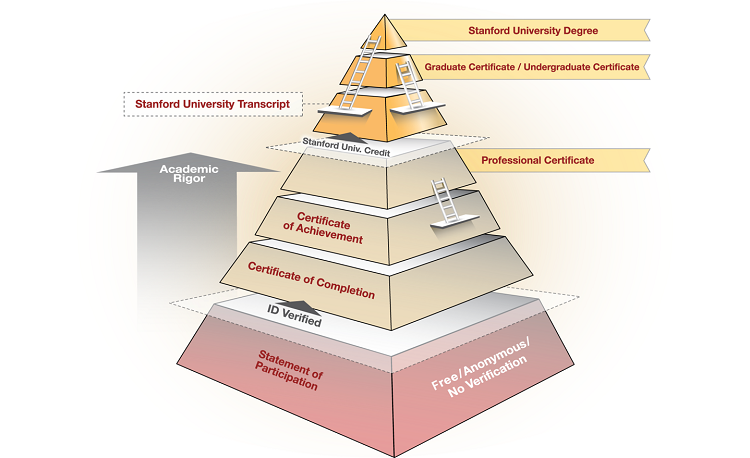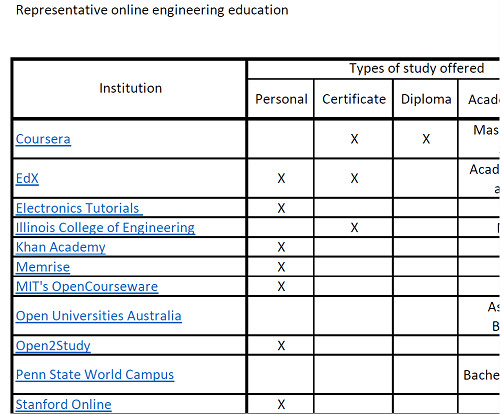By Richard Quinnell, editor-in-chief
The internet era brought with it unprecedented access to information from virtually anywhere in the world. The most efficient way of translating that information into knowledge and skill, however, is through training. Fortunately, there are also now an abundance of online training opportunities for electronic product developers. The key to maximizing results is to choose wisely from among the many options.
The amount of online engineering training available is mind-boggling, ranging from short tutorials on basic skills to full master’s degree programs from world-renowned universities. Cost and availability also vary widely. At one extreme, there are individual courses that are free of cost and available on demand. At the other end, there are entire programs rigidly scheduled and costing tens of thousands of dollars to complete.
So the first thing a designer seeking to further their engineering education needs to do is decide what result they want to achieve. If you just want to pick up some new insight into a specific topic, solely for your own information, there are numerous free tutorials and classes available. These range from simple tutorial articles on basic skills that take a few minutes to read to full, college-level video courses that will require many hours of dedicated effort to finish.
On the tutorial end, for instance, sources like AspenCore’s Electronics Tutorials website offer instructive articles on single-foundation topics such as resistors, transistors, Boolean logic, and the like. There are also many tutorials available through YouTube and iTunesU podcasts. For more academic training, sites like Khan Academy offer collections of audio/video lectures that form an extended course of study. These collections are usually wider-ranging and deeper in scope than single-topic articles and can represent academic levels from grade school through college level.
Full-fledged academic courses, identical to those being taught in colleges and universities, are also available for free online. EdX , for instance, offers more than 1,600 free college courses from renowned institutions worldwide such as MIT, the Sorbonne, and the University of Hong Kong. Many individual colleges also offer free access to some of their classes online, such as MIT’s OpenCourseware program and Stanford’s Stanford Online. Databases such as OEDB offer extensive lists of such courses.
Many online learners, however, want more from the time and effort spent in such courses than just the knowledge gained; they want credit for their effort that they can translate into employment or career advancement. Receiving a formal acknowledgement of your studies from the institution involved, however, typically comes with a price tag. To get a certificate or degree, you must be prepared to invest not only your time, but some of your cash.

There are many educational levels available online that, as this program description from Stanford University illustrates, range from simple, no-credit instruction to full college-degree programs.
Formally acknowledged online training also offers choices. One of the first to consider is what kind of acknowledgement you want to receive. There are certificates, diplomas, or academic degrees available, each with different career benefits and commensurate cost. In evaluating a fee-based course of study, then, you will want to look at which kind of credit you will receive.
Online credit varies in cost and significance
The most basic form of acknowledgement, or credential, is the certificate. This document typically attests that the learner has successfully completed a specific course on a specific topic. Often, “successfully completed” simply means that the learner has viewed all of the material comprising the course and does not provide a measurement of the learner’s subject mastery. It is the least persuasive of acknowledgements, indicating only that the learner has been exposed to the subject matter and not their skill level. Still, showing that you have had some training in a topic of critical interest to a potential employer may be enough to tip the scales in your favor over a competitor lacking any such indication. Certificate-awarding courses can range in cost from a few tens to a few hundreds of dollars.
The diploma is a step up from the certificate and typically indicates that the learner has completed a series of courses on the subject in question and demonstrated some level of competence in the material. The assessment of competence may take the form of quizzes administered during the coursework, completion of projects that an instructor evaluates, or the like. The diploma, thus, typically indicates greater competence and depth of knowledge in a somewhat broader topic than a certificate covers. As with certificates, though, a diploma’s significance to a potential employer strongly depends on the employer’s need for such knowledge.
The term “diploma,” however, can be somewhat misleading. When you earn an academic rank, such as a bachelor’s or an associate’s degree, you typically receive a document called a diploma. But what you have earned is a degree, and earning a diploma is not the same as earning a degree, despite the confusing multiple uses of the term. Earning a degree requires not only a course of study on a specific topic but includes a requirement for additional, general-education courses not directly related to the topic, such as math, history, and language. These additional courses provide a broader educational foundation than required for a diploma, demonstrating that the learner has valuable skills beyond the specific subject matter. Potential employers typically value academic degrees much more highly than diplomas.

To get you started pursuing an online engineering education, EP has prepared a chart (download link follows this article) showing some representative options.
Earning a degree online requires, as you might expect, a significantly greater expenditure of time, effort, and cash than certificates or diplomas. Many colleges and universities are now offering associate’s, bachelor’s, and even master’s degree programs in electronics and related fields online that require the exact same coursework as those earning the degree on campus. The scheduling, testing, and cost (to tens of thousands of dollars) are also often comparable. Lectures are provided in video form (sometimes interactively), and homework and tests get submitted online for evaluation and correction. There may even be study groups that form online to provide a social and interactive component to the training. The learner’s physical location (and the restrictions that this implies) is, thus, the primary difference between attending classes online versus on campus.
Many educators believe, however, that even though the training is the same, the absence of a physical presence on campus diminishes the result, and, thus, the academic value of the online degree. Many institutions — Yale University, for example — require at least some time on campus to complete the degree requirements. Not all do, however. Penn State’s World Campus, for instance, does not have a residency requirement for its engineering degree programs. It’s, therefore, best to check for such a requirement before signing up for a program in a distant university.
Some employers seem to also feel that online degrees have lower value and may give them less weight than a campus-earned degree in their evaluation of a candidate. This bias appears to be fading as online education becomes more common but remains a factor to be considered. In general, though, the better the school’s overall academic reputation, the more likely it is to be valued.
Check accreditation of degree programs
One of the key elements of reputation is the school’s accreditation by a recognized, independent evaluation agency. This is one of the most critical areas for online learners to evaluate when selecting a course of study intended to lead to an academic degree. Courses of study that have no accreditation may also prove to have no value in the eyes of potential employers.
But accreditation can be tough to resolve. The accreditation itself needs to be checked for reputation as well. It is entirely possible for a bogus online degree provider to tout an accreditation from an agency that has no recognized standing in the education industry. Learners should, therefore, check out both the degree-granting entity’s accreditation and the accreditation agency’s standing. The U.S. Department of Education maintains a list of both schools and accreditation agencies that users can check, but these only apply to schools in the USA. Other countries, however, may have a similar resource available.
So many colleges and universities worldwide now offer online training of one form or another that it is impractical to list them all here. There are several such listings available online, although none are truly comprehensive and some only list paying advertisers. Still, sources such as College Choice, OnlineU, and U.S. News and World Report can provide some useful suggestions for avenues to pursue.
Online engineering education provides developers with a host of opportunities for expanding their knowledge and furthering their careers that might otherwise be unavailable due to time and location constraints. To take best advantage of these opportunities, though, learners need to check out the topics being offered, the value being delivered, and the requirements for successful participation. These requirements include the time and effort needed, scheduling limitations, technology needs (internet speed, specialty software, and the like), and financial outlay. The downloadable chart (see the link following this article) prepared by Electronic Products provides a place to start looking.
Advertisement
Learn more about Electronic Products Magazine





